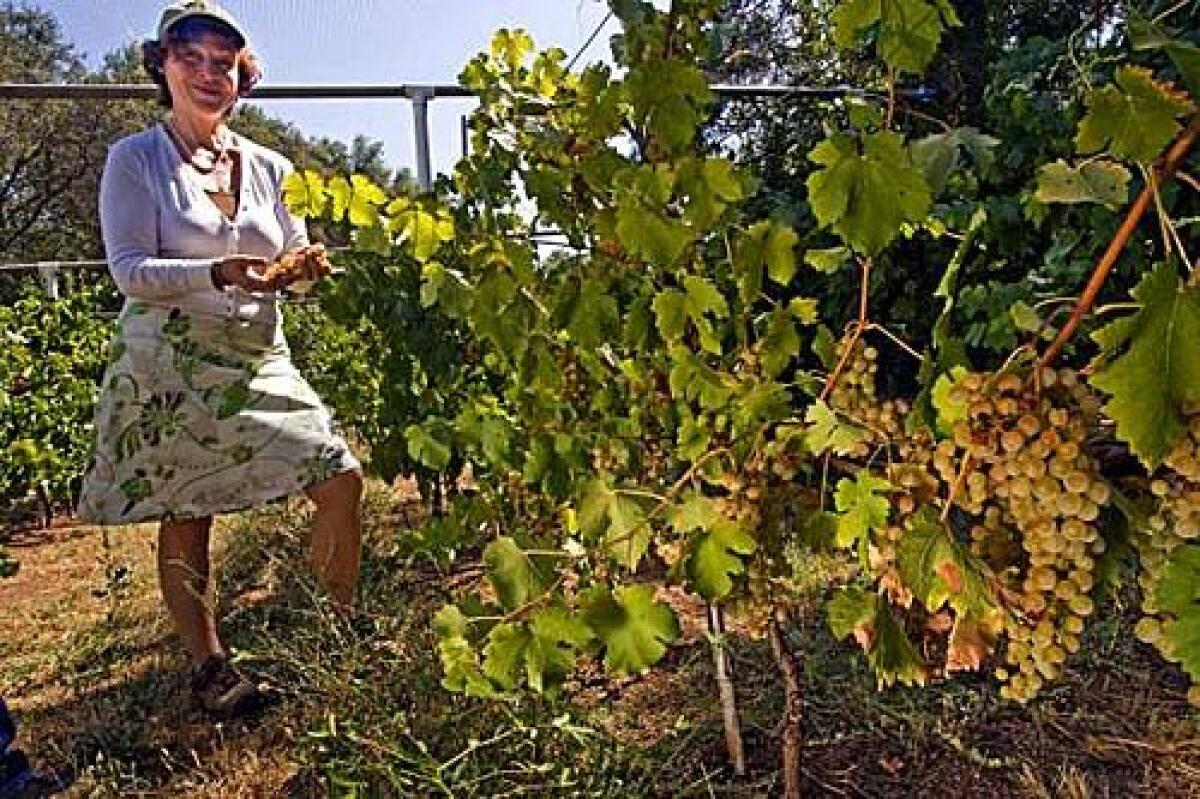Penryn Orchard Specialties continues a tradition of ‘mountain-grown’ fruits

- Share via
Jeff Rieger’s commute each week to the Santa Monica farmers market from his farm in Placer County-- 924 miles round trip -- is probably the longest regularly undertaken by any vendor at a Southern California certified market. He is driven by a passion to grow and market rare and high-quality fruits, all the more remarkable since he got into farming almost by accident.
It was the mandarins that hooked him. For 23 years he had lived near Lake Tahoe, first skiing, then painting houses, then building them on speculation. When Rieger and his girlfriend at the time bought a 4.3-acre property in Penryn, in the Sierra foothills northeast of Sacramento, in November 2002, he intended to fix up the house and flip it for a profit. But the owner had left the crop of satsuma mandarins on the trees, and Rieger started picking them and bringing them to a local store. Soon he split with the girlfriend and fell in love with the farm, which he named Penryn Orchard Specialties.
The orchard was indeed a beauty but in need of a lot of loving care. Established by George Oki, a retired Caltrans worker, it was part of a long local tradition, now fading, of fruit farming by Japanese American immigrants and their children. Oki planted the fruits traditionally beloved in Japan, such as Asian pears, persimmons, satsumas and loquats, as well as pears, peaches and apples. When he sold the property to Rieger he gave him a map of the orchard and said, “Good luck.”
“I didn’t know anything about farming at all,” says Rieger, 52, on a recent visit, pointing to the signs he hung on each tree to help him identify them. “I needed a map, I couldn’t tell a fig tree from a mandarin tree.”
So why become a farmer? “Everybody around here said you can’t make money farming,” he says. “I love a challenge.” So he sold his boats and antique books, maxed out his credit cards and devoted himself to renovating the orchard.
Fruit lovers have long prized “mountain-grown” pears, plums and peaches from the Sierra Nevada foothills, where the warm summer days and cool nights help crops mature slowly and develop rich, balanced flavor. Since World War II, competition from San Joaquin Valley orchards and encroaching development have marginalized the area’s commercial fruit industry, but a small number of artisanal farmers have spurred a revival based on “agri-tourism” and high-quality specialty produce.
Many of the trees Oki planted were heirloom or home garden varieties such as Howard Miracle and Elephant Heart plums, Indian Blood peaches and “chocolate” persimmons. These brown-fleshed persimmons have long been appreciated by connoisseurs but were virtually unknown and unavailable commercially until the last few years.
A neighbor, Tosh Kuratomi, taught him some of the secrets of the traditional Japanese art of making hoshigaki, or dried Hachiya persimmons, another variety growing on the farm. It’s a difficult, laborious process, requiring the peeling and frequent massage of thousands of fruits, but Rieger launched himself into making hoshigaki and eagerly promoted them as a gourmet product.
He might not have succeeded in making a living at farming had he not met his current girlfriend, Laurence Hauben, 51, in early 2004 at the Small Farm Conference in Sacramento. Born in France in an industrial area near the Belgian border, she often dreamed as a young girl of living in a house with an orchard.
In 1982 she placed an ad in this newspaper (“French girl, 23, looking for au pair job”) and received an offer; the next year she settled in Santa Barbara. She had a typically French passion for food and cooking, and eventually became a freelance food writer, restaurant manager and cooking teacher. From 2003 to 2005 she was executive director of the Santa Barbara Farmers Market Assn., and since 2001 she has been head of the Santa Barbara chapter of Slow Food.
For the first two years after buying his orchard, Rieger struggled to make ends meet by selling at local farmers markets, but Hauben introduced him to Laura Avery, the manager of the Santa Monica farmers market, who was intrigued by his chocolate persimmons and offered him a coveted spot.
Each week from August to December he drives south to Hauben’s home in Santa Barbara on Tuesday; the next morning they go Santa Monica, where they have flourished selling to restaurants such as Lucques, Lou and Campanile; to wholesalers; and of course to the public.
Hauben, who goes up to Penryn to work on the farm for a week or so every month, convinced Rieger to plant the varieties she missed from France: European pears such as Bosc, Comice and Forelle; greengage and mirabelle plums; and Chasselas Doré and Muscat Hamburg grapes.
Rieger and Hauben do everything, without hired help. The orchard is like his child; his greatest fear is bringing a bad piece of fruit to market, and a customer’s careless criticism can cause him agony. He has devoted himself to mastering the horticultural arts -- pruning, irrigation, fertilization, harvest -- with ferocious intensity.
“I know every single one of these trees personally, all of their proclivities, all of their weaknesses and strengths,” he says.
More to Read
Eat your way across L.A.
Get our weekly Tasting Notes newsletter for reviews, news and more.
You may occasionally receive promotional content from the Los Angeles Times.










